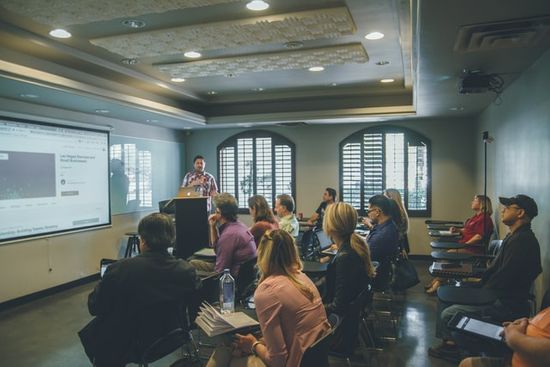What are Adventist Evangelistic Meetings?
The Seventh-day Adventist Church puts a huge emphasis on sharing the gospel through evangelism, or sharing the gospel through preaching, teaching, and testimony. One of the ways we accomplish this is by organizing public events called evangelistic meetings.
You might have heard of one—maybe through a friend or family member—or seen one advertised. Or you may even have been invited to one.
So let’s go over the details of what these meetings are all about:
- What is an Adventist evangelistic meeting, and why are they so important?
- What are the different types of evangelistic meetings?
- Who can attend them?
- How do you find one to attend?
Let’s begin with a deeper understanding of what exactly an evangelistic meeting is.
What is an Adventist evangelistic meeting?
 An Adventist evangelistic meeting is a meeting held by Adventists for the purposes of sharing the gospel and introducing people to the wealth of fascinating information in the Bible.
An Adventist evangelistic meeting is a meeting held by Adventists for the purposes of sharing the gospel and introducing people to the wealth of fascinating information in the Bible.
While the word “evangelism” refers to any act of sharing about Jesus and the teachings of the Bible, there are many different forms. These large public meetings are just one.
So the main purpose of Adventist evangelistic meetings is to point people to Jesus, show God’s love for humanity, and explore the truths of the Bible.
Generally, most denominations within Christianity hold such meetings, so it’s not unique to Adventists.
This practice can be traced back to Jesus Himself when He preached to crowds both large and small. Sometimes this would happen in people’s homes, at the seaside, or in open plains to a large gathering.1
The apostles and the early Christian church also followed Jesus’ example.2
In more recent history, these meetings have been referred to as:
- “Gospel meetings,” because their purpose was to preach the gospel
- “Revival meetings,” because they often called for, or led to, religious revivals
- “Protracted meetings,” because they could be a series of meetings spread over several days or weeks3
Then in the 19th century, they began to be called:
- “Tent meetings,” since they were held outdoors under large tents
- “Camp meetings,” because attendees would pitch tents around the main tent
Seventh-day Adventism was born around this time and adopted the camp meeting evangelistic model because it was so effective and enjoyable.4
These were 7-10-day meetings held annually in different locations.
Normally, one or several out-of-town preachers were invited as the main speakers. And there were morning, daytime, and evening sessions.
Messages were Christ-centered, emphasizing the transforming power of the gospel and inviting all to a closer walk with Jesus.
There was also deeper Bible study of prophecy, and other practical issues like health, and family life.
Then with time, they began holding them in church buildings and other public spaces.
Adventist evangelistic meetings today
 Today, these meetings continue in Adventism. And being in the 21st century, you can bet they’re quite different in terms of setting, style, and programming.
Today, these meetings continue in Adventism. And being in the 21st century, you can bet they’re quite different in terms of setting, style, and programming.
They are often referred to as prophecy or health seminars, since those are common topics that garner a lot of interest.
And rather than taking several full days, like tent meetings of the past, they may be short evening meetings over a span of a few days, or on specific days of the week.
Also, apart from being held in church buildings, they can be located in:
- Community centers
- Hotels and conference facilities
- Convention centers
- Stadiums
- School and college campuses
- Open-air parks, amphitheaters, or other large public areas
And beyond being just in person, many of them are also held virtually, aired online, or through various media outlets.
But even with the changes, the purpose and message of the meetings remain the same—to teach the love of Jesus Christ.
A meeting usually includes some moments of prayer to ask for God’s guidance and blessing on the event, and for the Spirit of God to lead both the preacher and attendees to a deeper commitment to God and the Bible.
There may also be singing, testimonies from attendees, panel discussions, or question and answer sessions.
There is also a focus on discipleship, where attendees who showed interest in learning more about Jesus and the Bible can receive further resources, mentorship, or fellowship with a small group.
But most Christian denominations hold evangelistic meetings in a similar manner. So what is it that makes Adventist evangelistic meetings different?
What’s unique about Adventist evangelistic meetings?
As we’ve mentioned before, Adventist evangelistic meetings are similar to other Christian meetings for evangelism.
The one thing that makes them “Adventist” is how Adventist beliefs are part of the teachings. Beliefs like the spirit of prophecy, the Sabbath, and whole-person health are uniquely Adventist teachings that are also extremely relevant to our lives today. So Adventists are eager to share these potentially life-changing things with others who are searching.
That’s why we have meetings like health seminars and cooking schools, which may not be common parts of other denominations’ meetings.
Also, Adventists emphasize the importance of everyone reading the Bible for themselves, and confirming the words of Scripture. In an Adventist meeting, you’ll notice everything preached is backed by Scripture. And the preacher encourages everyone to bring their Bibles and follow along, rather than just listening to the presenter.
We’ll look at the different types of meetings in Adventist evangelism next.
What are different types of evangelistic meetings?
 Adventist evangelistic meetings are usually tailored to meet varying needs of those attending. There are meetings like:
Adventist evangelistic meetings are usually tailored to meet varying needs of those attending. There are meetings like:
They can be large or small events, formal or more relaxed…it all depends on the type and the type of community they’re held in.
They are often organized by the local church in a given place. Mostly, members are trained to participate in different areas. Other times, guest speakers, professionals like doctors, chefs, dieticians, or biblical scholars are invited to tackle specific topics.
Let’s look at the different types.
Prophecy seminars
 Prophecy seminars are a series of meetings that look at Bible prophecy, especially from the books of Daniel and Revelation.
Prophecy seminars are a series of meetings that look at Bible prophecy, especially from the books of Daniel and Revelation.
They can also be called “prophecy conferences” or “prophecy summits.”
The preacher systematically covers:
- How Bible prophecy has been fulfilled in the past
- How some prophecies are being fulfilled today, or in an ongoing manner
- Prophecies that are yet to be fulfilled
It can be fascinating and even fun, with all kinds of interesting evidence to show how God has fulfilled Bible promises and predictions. This can include a deep dive into historical timelines, looking at great historical personalities and ancient kingdoms, or reviewing archeological discoveries.
There’s also a pointed focus on Last-day or End-time events that the Bible predicts will come upon the earth sooner than we probably think, as we look forward to Jesus’ soon return.
With this, you’ll learn how to live for Christ in today’s world, and how to prepare for the end times.
Examples of such meetings are:
- Pastor Mark Finley’s Revelation’s Ancient Discoveries, and The Book of Daniel series
- Pastor Taj Pacleb’s Revelation of Hope Bible Prophecy Seminar
In some cases, the meeting is referred to as an evangelistic campaign or evangelistic series when it’s a large-scale event.
It could be a single session based on a given theme, but organized to reach a larger audience. Maybe by having it conducted in multiple locations simultaneously, or aired through multiple media channels with a heightened sense of urgency.
Good examples are the Total Member Involvement evangelistic meetings and the Unlocking Bible Prophecies campaign.
In some parts of the world, the meeting could include many different types of sessions together.
For example, the event may be every evening of a given week. And it may comprise:
- A short Bible study session
- An hour or so prophecy seminar
- Various health education programs breakout session
- Family life small groups session
Or there can be a large-scale health clinic a day(s) before the evangelistic meeting, or concurrently with the meetings.
Each of these sessions will normally be tied together by a single theme for the whole event.
Family life programs
 These are programs for the family, often tailored for certain age groups, or based on family roles. They include:
These are programs for the family, often tailored for certain age groups, or based on family roles. They include:
- Parenting workshops
- Programs for married couples
- Programs for youth, children, men, or women
Health Seminars
Because of Adventists’ great regard for healthy living, they include health education as part of their evangelistic efforts.
They’re mostly interactive, with some even including demonstrations, as we’ll see.
And apart from addressing health of body and mind, they often start off with a short devotional—usually prayer and some Bible reading. This takes care of spiritual health.
Let’s look at the different programs that promote a healthy lifestyle.
Lifestyle education programs
These go through the different principles for healthy living.
In these programs, you’ll learn the health benefits of these gifts of nature, and practical ways to implement them in your daily life.
The program can run for weeks, with meetings on one day, and the rest of the week to practice.
It can also run as part of a NEWSTART health expo, like this virtual program by an individual congregation, the Camp Hill Seventh-day Adventist Church. Or as a community health clinic like Your Best Pathway to Health.
Mental health programs
 These focus on mental health, looking at how spirituality and preventive lifestyle methods can help us.
These focus on mental health, looking at how spirituality and preventive lifestyle methods can help us.
You’ll get a deep understanding of mental issues in today’s world. As well as learn the latest in scientific research and lifestyle practices that help in mental health cases.
An example is the eight-week depression and anxiety recovery programs offered by churches like Alvarado Seventh-day Adventist Church.
Cooking classes
Since a healthy diet is an important part of healthy living, Adventist churches often have cooking schools. They provide healthy recipes and cooking demonstrations.
Here, you’ll learn all the kitchen secrets of making simple, healthy, and affordable, but also sumptuous meals.
An example is Joy of Living Cooking School by Woodside Seventh-day Adventist Church.
Addiction recovery programs
These are programs to walk with those struggling with various addictions in their journey to recovery.
The programs are often called “Journey Groups”. They’re based on a 12-step workshop called Journey to Wholeness, put together by the Adventist Recovery Ministries.
These provide a safe environment for participants to share experiences and reach for freedom through the help of the Holy Spirit.
Who can attend Adventist evangelistic meetings?
Adventist evangelistic meetings are open for everyone.
Whoever you are, you are welcome—with or without a personal invitation. You can always walk in and there will be someone to receive you and fill you in on the details of the event.
Whether you’re an Adventist church member, active or inactive. Or any other Christian denomination. Or even if you are non-Christian.
How to find Adventist evangelistic meetings
The easiest way to find out about an upcoming meeting is at your local Adventist church. You can learn from announcements during Sabbath worship service, or the church bulletin, the church pastor, or even church members.
You can also find up-to-date information on the Adventist church website, or other social platforms.
Or you can search online for meetings at other churches apart from the one nearest to you. Another place to look is various Adventist evangelism groups like Amazing Facts.
You can locate the evangelistic meeting and attend live, or virtually on their websites, on Youtube, or Facebook.
Also, many past events are now available online on-demand as full videos or as a playlist. Examples include:
- It Is Written
- Three Angels Broadcasting Network (3ABN)
- Amazing Facts
- Hope Channel International
- Amazing Discoveries
- Secrets Unsealed
Adventist evangelistic meetings are all about sharing Jesus
 As you’ve seen, these meetings are centered on sharing hope, truth, and the love of Jesus. Be it through prophecy seminars, or the healing ministry of the health seminars.
As you’ve seen, these meetings are centered on sharing hope, truth, and the love of Jesus. Be it through prophecy seminars, or the healing ministry of the health seminars.
They all lead us to experience the transforming power of the Holy Spirit in our lives.
They are great opportunities to draw closer to Jesus and gain a new perspective. A new perspective on life, our relationships with ourselves, with others, and with God.
To learn more about what Adventists believe and teach, check out the Adventist beliefs page.
Want to learn more about What are Adventist Evangelistic Meetings?
Questions about Adventists? Ask here!
Find answers to your questions about Seventh-day Adventists
More Answers
The Health Benefits of Fresh Air You Should Know About
The Health Benefits of Fresh Air You Should Know About“When you can’t breathe, nothing else matters,” the American Lung Association tells us. And while that’s true, the kind of air you’re breathing will determine the health benefits you experience. Breathing fresh...
What Do Seventh-day Adventists Choose to Eat?
What Do Seventh-day Adventists Choose to Eat?Food blogs overwhelm the internet; food fads are all the rage; and copycat and healthy versions of food are the subject of many a get-together. Eating—and eating the best way—is a big deal. And everybody has a different...
10 Incredible Ways Sunlight Can Improve Your Health
10 Incredible Ways Sunlight Can Improve Your HealthAre you concerned about sunlight’s negative effects? You might be the one who lathers on the sunscreen and covers up when you go outside. Or maybe you avoid being outside as much as possible. You might be surprised,...
Why Is Water So Important?
Why Is Water So Important?We all know that water is a substance we can’t live without. It quenches our thirst and keeps us hydrated on the inside. And it’s necessary for hygiene and cleansing on the outside too. But did you know that the cleansing properties of water...
Ellen White’s Writings and the Adventist Health Message
Seventh-day Adventists are known for their emphasis on healthy living. And Ellen G. White was a significant influence in the development of this priority and practice among Adventists.
Health Clinics
Ellen White and Adventist Healthcare—Ahead of Their Time Medical care in the mid-1800s was primitive, to say the least. Basic concepts we take for granted—such as proper handwashing or recognizing the dangers of bloodletting—were nonexistent. And doctors often had...
What Did Ellen White Teach about Vegetarianism?
What Did Ellen White Teach about Vegetarianism?One thing you might have heard about Seventh-day Adventists is their emphasis on a vegetarian lifestyle. If you’re wondering why that is, it goes back to our church’s humble beginnings: As Adventists studied the Bible,...
How Ellen White’s Teachings Can Improve Your Health
How Ellen White’s Teachings Can Improve Your Health Healthcare in the nineteenth century was said to leave “more disease than it took away” with its use of bloodletting and “medicines” like mercury and arsenic.1 As people questioned these methods, new approaches...
Change Your Perspective on Life with These 5 Mindsets
5 Biblical Mindsets to Change Your Life for the Better Sometimes, life is just plain hard. There’s no way around it. So would thinking about things differently really change anything? Our perspective on life, and everything it throws at us, affects more than we’re...
Bible Promises for When You’re Worried or Fearful
Bible Promises for When You’re Worried or Fearful The Bible is full of beautiful promises that can comfort us in a variety of situations. They can give us hope when we are hopeless, make us feel grateful for God’s love, and comfort us when we’re grieving or suffering....
12 Practical Ways to Overcome Worry
12 Practical Ways to Overcome Worry DISCLAIMER: This content is for informational purposes only. It does not constitute any professional medical advice and is not intended as a substitute for professional mental health therapy. It’s easy to get stuck in a cycle of...
How the Bible Talks About Worry, Fear, and Anxiety
How the Bible Talks About Worry, Fear, and Anxiety Worry and fear are the ingredients of anxiety. It’s easy to see how the world isn’t perfect—and the anticipation of a bad event or experience (that may or may not even happen) can end up draining the peace and...
How to Calm Anxious Thoughts, Using the Bible
How to Calm Anxious Thoughts, Using the Bible You were expecting a phone call from your daughter half an hour ago, and she still hasn’t called. She’s also not answering your calls. You feel your heart thumping as your thoughts race: What if she’s been in a car...
What You Should Know About the Adventist Health Studies
What You Should Know About the Adventist Health StudiesYou may have heard that Seventh-day Adventists care about health. But what you may not know is that Adventists have been the subjects of long-term research into lifestyle and health. Since 1958, researchers from...
Benefits of Sunlight
Yes, There Are Health Benefits of SunlightDespite the bad reputation it’s gotten, sunlight is generally associated with positivity, as shown by songs like “You Are My Sunshine,” or phrases that refer to delightful people as having a “sunny disposition.” There’s a...
Why Your Body Needs Rest for Optimal Health
Why Your Body Needs Rest for Optimal HealthStruggling to think straight? Wondering why you can’t remember that important tidbit you heard earlier today? Feeling like your emotions are about to explode? These are just some of the symptoms that can reveal your need for...
The Seventh-day Adventist Diet: One of Our Key Longevity Secrets
The Seventh-day Adventist Diet: One of Our Key Longevity SecretsOats, avocados, lentils, tofu—probably not what you first think of in a standard American diet. But if you show up at the home of an Adventist, chances are you may be served one of these staples. Out of a...
Why You Need Fresh Air
Why You Need Fresh Air“When you can’t breathe, nothing else matters,” the American Lung Association tells us. We couldn’t agree more! Breathing in clean air is an essential part of caring for our bodies, which God has given us. Together with other health principles,...
Sabbath Meal
Everything You Need to Know About Sabbath MealsFor Seventh-day Adventists, sharing a Sabbath meal with friends and family is one of the most special and memorable parts of the Sabbath. That’s why we want to share with you all about Sabbath meals and why they’re such a...
Adventists and Healthy Living
Adventists and Healthy LivingWhat’s the Adventist “Health Message” All About? One thing Seventh-day Adventists are known for is their emphasis on living healthy lives. Since our bodies are living temples of the Holy Spirit (1 Corinthians 6:19, 20), we strive to stay...
Water’s Importance—Physical Benefits and Spiritual Applications
Water’s Importance—Physical Benefits and Spiritual Applications We all know that water is a substance we can’t live without. Not only does it quench our thirst and keep us hydrated from the inside, but it’s necessary for hygiene and cleansing on the outside as well....
How Important is a “Day of Rest?”
How Important is a “Day of Rest?” Why God Created a Day for Downtime by Martin Casper Do you ever experience the feeling of complete overload? Do you feel like the only way you can get ahead is by slamming it 24/7? I hear these types of comments more and more...
7 Reasons Why a Day of Rest is Important
7 Reasons Why a Day of Rest is ImportantWe live in a fast-paced world. It seems as if success is measured in how much you can do in a short amount of time. (Extra points for the service or product that is available 24/7). The idea that we will be more successful if we...
How do Adventists choose what to eat?
How do Adventists choose what to eat?Every day, parents go through the ritual of getting their kids to eat what is healthy and good while trying to steer them away from what can hinder the growth of their developing bodies. Nutritionists work with their clients to...
How Can I Have a Better Marriage?
Is it possible to have a happy marriage?
How do Adventists make movie and music choices?
How do Adventists make movie and music choices?Cinema has come a long way since the first clips of motion pictures came to light in 1878. As the decades rolled on, film and music producers have created rivers of movies and albums for the masses. Today, watching movies...
Why are many Adventists Vegetarian?
Why are many Adventists Vegetarian?The diet intended for man is outlined in Genesis 1:29, “And God said, ‘See, I have given you every herb that yields seed which is on the face of all the earth, and every tree whose fruit yields seed; to you it shall be for food.’”...
Didn’t find your answer? Ask us!
We understand your concern of having questions but not knowing who to ask—we’ve felt it ourselves. When you’re ready to learn more about Adventists, send us a question! We know a thing or two about Adventists.























